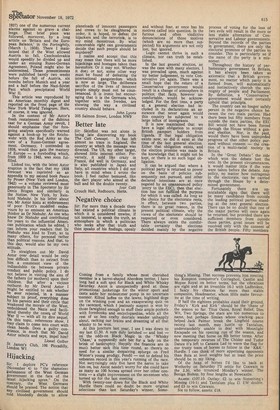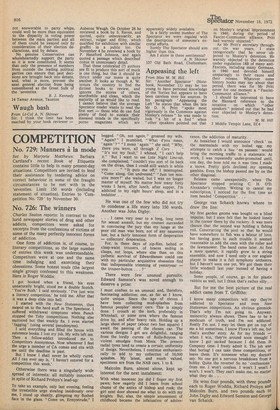Negative choice
Sir: For more than a decade there has existed a political climate in which it is considered unwise, if not immoral, to speak the truth, an atmosphere in which a politician who seeks after that truth and then speaks of his findings, openly and without fear, at once has his motives called into question. In the furious and often vindictive denunciations of those motives (which are no more than suspected) his arguments are not only lost, but ignored.
Logic cannot thrive in such a climate, nor can truth be established.
In the last general election, as was the case with many electors, I was prevailed upon, much against :ny better judgement, to vote Conservative yet again. There was a small hope that the return of a Conservative government would result in a change of atmosphere in politics; that facts, however uncomfortable, would be acknowledged. For the first time, a party at a general election had included in its declarations an assurance that never again would this country be subjected to a large influx of immigrants.
It is now maintained that we have a legal obligation to accept British passport holders from Uganda. If that legal obligation exists now, so did it exist at the time of the last general election. Either that obligation exists, and the election promise was made in the knowledge that it might not be kept, or there is no such legal obligation. It can be argued that where a political party is returned to power on the basis of policies subsequently not pursued, and other declared intentions are at once negated by an unannounced policy entry to the EEC), then that election has not fulfilled the purpose for which it was called. As long as the choice for the electorate rests, in effect, between two parties, there is no great reason, in the present political climate, why the views of the electorate should be respected or even considered. There always exists the comfortable certainty that elections decided mainly by the negative process of voting for the less of two evils will result in the more or less stable alternation of Conservative and Labour governments. Beyond the records of the parties in government, there are only the electoral promises of the parties to consider. This is particularly so if the name of the party is a misnomer.
Throughout the history of parliamentary government in Britain, it has always been taken as axiomatic that a British government, no matter which party it is formed from, will automatically and instinctively cherish the sovreignty of people and Parliament. By definition, a ' Conservative ' government would most certainly uphold that principle.
The country can no longer safely persist in the negative choice between the two main parties. Had there been but fifty members from outside the main parties, the EEC Bill would not have been forced through the House without a general election. Nor, in the past, would there have been unimpeded progress of that other policy pursued without consent — the creation of a multi-racial society in Britain.
In the 'Great Debate' the side which won the debate lost the vote. In the present circumstances, it would matter little if the vote were taken before the debate. Any policy, no matter how outrageous to the electorate, can be carried through the House by a determined government.
Fortunately there are unmistakable signs that there will be many candidates from outside the leading political parties standing at the next general election. There can be no doubt that one of the major parties will once again be returned, but provided there are sufficient members from outside those parties, great issues will be resolved only with the consent of the British people. Fifty members not answerable to party whips, could well be more than equivalent to the disparity in voting power between the main parties; and all of them could be swayed only by consideration of their election declarations, and by debate.
No genuine Conservative can wholeheartedly support the party as it is now constituted. It seems that only the presence of members from outside the leading political parties can ensure that past decisions are brought back into debate, and, what is more, prevent the next general election from being remembered as the Great Sulk of the 'seventies.
B. J. Kennedy 14 Tamar Avenue, Taunton



















































 Previous page
Previous page